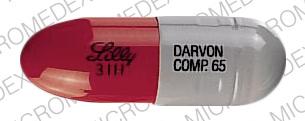Aspirin / Caffeine / Propoxyphene Dosage
Applies to the following strengths: 389 mg-32.4 mg-65 mg; 389 mg-32.4 mg-32 mg
Usual Adult Dose for:
Usual Geriatric Dose for:
Additional dosage information:
Usual Adult Dose for Pain
ASA/caffeine/propoxyphene was voluntarily withdrawn from the US market by the manufacturer in November 2010 due to new data showing that the propoxyphene component can cause serious toxicity to the heart, even when used at therapeutic doses. The following dosage information applied to when ASA/caffeine/propoxyphene was available in the US:
For use in the relief of mild to moderate pain:
1 capsule orally every four hours as needed for pain.
Maximum dose: based on 390 mg per day of propoxyphene hydrochloride
Usual Geriatric Dose for Pain
ASA/caffeine/propoxyphene was voluntarily withdrawn from the US market by the manufacturer in November 2010 due to new data showing that the propoxyphene component can cause serious toxicity to the heart, even when used at therapeutic doses. The following dosage information applied to when ASA/caffeine/propoxyphene was available in the US:
Regarding "Usage in the Elderly", the manufacturer of aspirin/caffeine/propoxyphene states that "The rate of propoxyphene metabolism may be reduced in some patients. Increased dosing interval should be considered."
Therefore, the dose recommended for use in geriatric patients for use in the relief of mild to moderate pain is 1 capsule orally every six hours as needed for pain.
Renal Dose Adjustments
The manufacturer of aspirin/caffeine/propoxyphene states that "Consideration should be given to a reduced daily dosage in patients with hepatic or renal impairment."
Detailed information concerning the pharmacokinetic disposition of aspirin in patients with renal dysfunction is not available. Aspirin should be used with caution in chronic renal insufficiency, since it may cause a transient decrease in renal function. The use of aspirin in patients with severe renal impairment (CrCl <10 mL/minute) is not recommended due to the potential for increased risk of salicylate toxicity.
Liver Dose Adjustments
The manufacturer of aspirin/caffeine/propoxyphene states that "Consideration should be given to a reduced daily dosage in patients with hepatic or renal impairment."
However, the use of aspirin in patients with severe hepatic impairment is not recommended due to the potential for increased risk of clinically significant bleeding and other adverse effects.
Also, propoxyphene should be used with great caution, if at all, in patients with liver disease. Because of the risk of accumulation of propoxyphene in patients with liver disease and because patients with liver disease may be particularly sensitive to the sedative properties of this drug, use of multiple doses of propoxyphene is not recommended. If this patient has hepatic failure, use of propoxyphene is not recommended.
Precautions
Aspirin has been associated with Reyes syndrome; therefore, this drug should not be taken by children and teenagers with the chicken pox or flu.
Aspirin is contraindicated in patients with severe bleeding, coagulation or primary hemostasis disorders, nasal polyps associated with asthma, peptic ulcer, serious GI lesions, or on anticoagulant therapy.
Aspirin should be discontinued 5 days before surgery.
Do not prescribe propoxyphene for patients who are suicidal or addiction prone.
Advise patients not to exceed the prescribed dose and to limit their intake of alcohol.
Dialysis
Detailed information concerning the removal of aspirin by hemodialysis is not available. Some investigators have suggested that aspirin and/or salicylate may be removed by hemodialysis and that aspirin dosing should follow dialysis sessions.
Propoxyphene is not dialyzable.
More about aspirin / caffeine / propoxyphene
- Check interactions
- Compare alternatives
- Reviews (6)
- Side effects
- During pregnancy
- Drug class: narcotic analgesic combinations
Related treatment guides
Further information
Always consult your healthcare provider to ensure the information displayed on this page applies to your personal circumstances.

